A long and very positive review here.
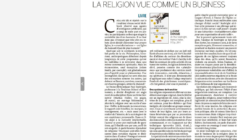
This is a list of my books.

A long and very positive review here.
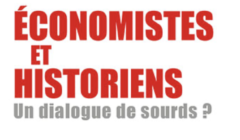
I have an essay (in French) in this volume edited by Alain Trannoy and Arundhati Virmani and published by Odile Jacob.
J’ai un chapitre en français dans ce livre sorti en janvier 2025.
Un petit extrait de mon chapitre:
“Une vision assez courante des sciences sociales les représente comme étant en lutte éternelle contre les séductions du récit. Le récit, c’est l’éloge de l’histoire individuelle, anecdotique, suffisamment atypique pour être remarquée – alors que les sciences sociales s’intéressent aux statistiques, à l’expérience générale d’une population, aux réalités agrégées où l’individu se fond dans la masse. On entend même parfois que notre attachement au récit relève d’une « addiction » : c’est la thèse, par exemple, d’un livre du philosophe Alex Rosenberg publié en 2018 par la MIT Press et intitulé How History Gets Things Wrong : The Neuroscience of our Addiction to Stories.[1] Rosenberg va très loin dans sa dénonciation : « Narrative history is always, always wrong. It’s not just incomplete or inaccurate but deeply wrong, as wrong as Ptolemaic astronomy ». Mais même des chercheurs qui sont moins hostiles par principe aux récits ont tendance à penser que l’amélioration des sciences sociales vient de l’utilisation des méthodes statistiques pour surmonter les biais inhérents aux récits que chaque discipline a hérité de son passé. Ceci est le point de vue du livre publié en 2021 par le politologue Matt Grossman et intitulé : How Social Science Got Better : Overcoming Bias with More Evidence, Diversity and Self-Reflection.[2]
Il est indéniable que la place des statistiques est devenue bien plus centrale aux sciences sociales depuis quelques années. Doit-on en conclure que la valeur du récit est devenue moindre, ou encore que le récit soit destiné à disparaître d’une conception des sciences sociales vraiment scientifique, dans le meilleur sens du terme ?Cet essai proposera une réponse négative à la question. Le récit non seulement ne disparaîtra pas. Il sera encore plus ancré dans la pratique des sciences sociales, même les sciences sociales les plus quantitatives….”
[1] Rosenberg (2018).
[2] Grossman (2021). Morgan (2021) montre que l’utilisation du récit dans le travail des historiens économiques a parfois servi à combler des lacunes dans leurs données disponibles. Un point de vue français sur ces biais dans les travaux des historiens se trouve dans Hartog (2003, 2021), et notamment dans son analyse du « présentisme ». “
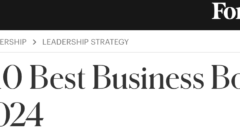
The list is here. And the other titles look really interesting…
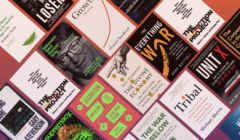
I’m happy to hear that The Divine Economy made the longlist, together with 15 other excellent titles out of 600 submitted. It did not make the shortlist, which was announced on September 17th.

Voici quelques articles parus sur The Divine Economy dans la presse française:
1) Par Jean Duchesne dans Aleteia – “En quoi la foi n’est pas étrangère aux réalités économiques”. Moins une critique du livre qu’un survol d’approches à la place des sciences économiques dans l’étude de la religion. Article ici.
2) Entretien avec Thomas Mahler dans l’Express: “Au niveau mondial, le christianisme n’est pas en déclin face à l’islam”. Article ici.
3) Par Bertrand Jacquillat dans l’Opinion – “Plateformes numériques et religions: rivalités et concurrence”:
“Il peut paraître iconoclaste de soumettre l’espace religieux à l’analyse économique. Les religions pourtant s’y prêtent, du fait qu’elles partagent certaines des caractéristiques des organisations séculaires, et bénéficient d’une puissance financière indéniable”.
4) Une critique anonyme courte mais favorable dans books.fr: “Les religions comme marques”.

The Divine Economy has been selected by Martin Wolf of the Financial Times as one of the best summer books of 2024 (Economics). When I asked Dalle to provide an accompanying image, this is what resulted (after a few adjustments….).
Image generated by DALL·E, an AI model by OpenAI.
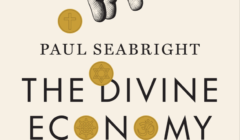
Book events:
AALIMS conference in Princeton, 11th April 2025.
The book was published by Princeton University Press on 14th May 2024. It was long listed for the FT/Schroders Business Book of the Year Award 2024, and was a finalist in the 2025 PROSE awards of the Association of American Publishers.
Here is a contribution to PUP’s Ideas page to mark the release: “A sermon from a mountebank? Religious messaging in the age of AI“.
Here is an extract in Foreign Policy: “The Divine Marketplace is Pretty Crowded”.
Here is an extract in The Milken Institute Review.
Launch events were held at the University of Glasgow on 28th May and at the London School of Economics on 29th May. The lecture at the LSE was recorded, and is available on YouTube here.
I discussed the book on 11th June during the launch event for the Starling 2024 Compendium, with Harvard Business School’s Amy Edmondson.
I gave a talk in a panel at the Society for Scientific Study of Religion, Annual Meeting, Pittsburgh, 18th October 2024, with the excellent David Hollinger.
I gave the Score Strand III Lecture at the University of Cambridge on 17th November 2024, and have given book talks at the University of California at Berkeley, Chapman University and the University of Texas at Austin.
I published a piece on 30th August in IAI News entitled “How Religion Wrote the Playbook for Big Tech: Studying Religion from the Outside In“.
Reviews, podcasts and interviews are available here.
The announcement page is here, and you can order it there are well.
You can also order it on Amazon here.
Details of the French translation are here.
The data files for the Statistical Appendix are available here.
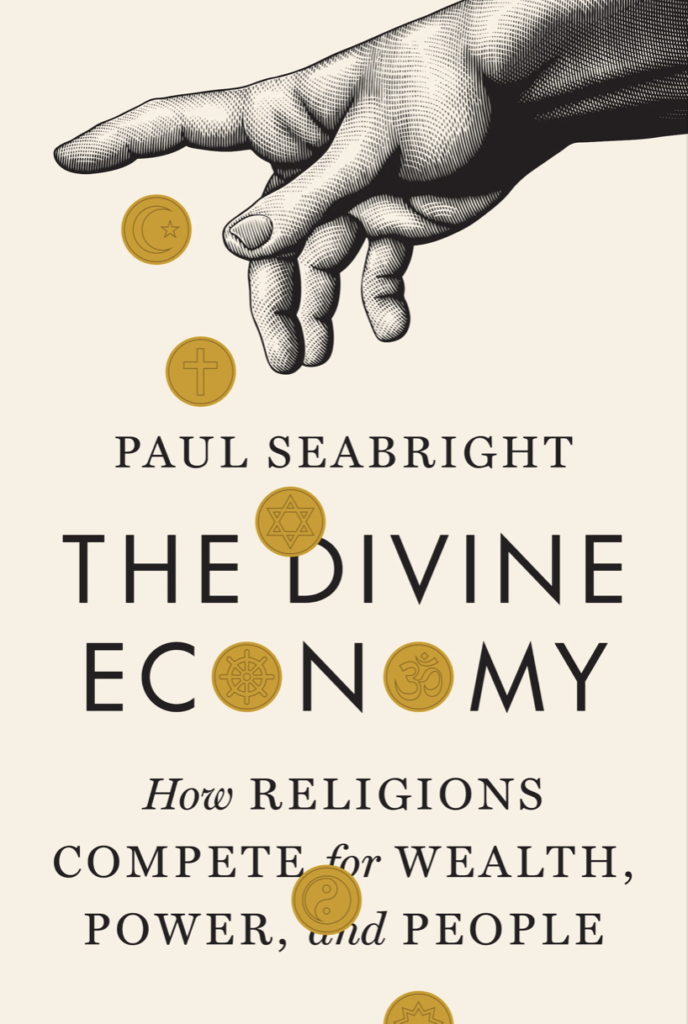

If you want to propose a review, or alert me to one that has appeared and that is not mentioned on this page, you can contact me here.
Books of the year (or books of the season) lists:
FT/Schroders Business Book of the Year Longlist.
Forbes’ 10 Best Business Books of 2024.
London Business School Best Books of 2024.
Martin Wolf’s Summer Reading for 2024.
PROSE awards 2025 of the Association of American Publishers.
Reviews and interviews:
In English:
1) By Sascha Becker, review in the Journal of Economic Literature:
“[A]n insightful and enjoyable read. [Seabright’s] platform view makes for a fresh look at religious organizations. I suspect that all scholars of religion economics will find the book equally insightful. For those less familiar with the economics of religion, the book is also an easy-to-read launchpad to the field. . . it will enthuse broad-minded social scientists as well. Finally, since the book addresses ‘big questions’ in an accessible and engaging style, it will also be of interest to nonspecialists.”
2) In The Economist – “God™: an ageing product outperforms expectations”:
“The Divine Economy looks at how religions attract followers, money and power and argues that they are businesses—and should be analysed as such.
Professor Seabright calls religions “platforms”, businesses that “facilitate relationships”. (Other economists refer to religions as “clubs” or “glue”.) He then takes a quick canter through the history, sociology and economics of religions to illustrate this. The best parts of this book deal with economics, which the general reader will find enlightening.”
3) By Jane Shaw, in The Financial Times – “Is religion just like business?”:
“A wide-ranging book, full of fascinating examples from the world’s many religions…Using his economist’s tools to analyse the lasting power of the world’s religions, Seabright has produced an engaging and insightful book, which I found myself pondering long after I had read the last page. Religion is a powerful force in many parts of the world. The religions that continue to be successful in a rapidly changing environment, he concludes, keep evolving to remain so.”
4) By Martin Wolf, in The Financial Times‘ Best summer books of 2024: Economics:
“Seabright has a great talent for addressing original questions. In this book, he reverses the familiar trope that religion is the antithesis of mere economics. On the contrary, he argues, religions are competing businesses: they attract people by providing services they value, from the mundane — a community in which to find a compatible mate — to the sublime — a sense of life’s meaning. Since these wants will not disappear, neither will religions. But, he concludes rather encouragingly, religions will fail if they choose to shackle themselves to tyrants. One hopes he is right.” See an associated DALLE image here.
5) By Shadi Hamid in Foreign Affairs: “Secular stagnation: How Religion Endures in a Godless Age”.
“The Divine Economy is an ambitious work that attempts to think economically about something that so often seems beyond the grasp of the social sciences….As Seabright puts it, “Without economic resources behind them, the most beautifully crafted messages will struggle to gain a hearing in the cacophony of life.” It is rare and even refreshing to have a book about the rise of religion that concludes, in a sense, that it’s the economy, stupid…..If there were a world in which people cared only about calculating their economic self-interest, the power of religion would be significantly blunted. But the world does not quite work that way—and, if Seabright’s analysis is any indication, it won’t any time soon.”
6) With Stephen Scott in the Starling Compendium, pp. 409-414: “An Interview with Paul Seabright”, covers both The Divine Economy and The Company of Strangers.
7) By Jonathan Benthall in The Times Literary Supplement: “The free market in faith: viewing religion through the lens of economics”.
“Combining tough-mindedness and cultural sensitivity, Paul Seabright may help to bring religion nearer to the mainstream of international political debate.”
8) By Arnold Kling in EconLib: “The Religion Business”.
There is a “tension between the narrow definition of religion and Seabright’s broader platform perspective. If religion were merely the belief in certain animal spirits, then at least in the United States we would be happy to rely on the First Amendment and a tolerant attitude of, “sure, whatever floats your boat.” But as platforms, religions have an impact on the economy, on politics, and on social relations in general. Friction would seem to be inevitable, and it becomes unclear how best to apply the First Amendment.”
9) By Atul K. Shah in The LSE Review of Books blog:
“The Divine Economy draws from the insights of sociology, anthropology, psychology, political economy and philosophy to show the deep the effect of faith in everyday life and explains why religiosity has been dynamic rather than static, and creative in response to the challenges of modernity. It shows how the prediction that secularism would prevail in an age of science and reason has been proved wrong, precisely because religion provides people with meaning, purpose and community, which secularism alone often fails to deliver. For me, religion’s scope and challenge has been truly ambitious, and the book has risen to this through a structured organisation, beautiful narratives and accessible language, authoritative open-minded research, all compiled from decades of study of the economics of religion.”
10) By an anonymous reviewer in The Interim:
“Paul Seabright, an economist at the Toulouse School of Economics, ambitiously applies not only economics but anthropology, history, philosophy, political science, psychology, science, and sociology, to understand how the world’s religions…attract and retain followers and thus money and power to sustain themselves over time. Furthermore, Seabright does so looking beyond the Abrahamic religions and all in 341 pages before landing at the statistical appendix, endnotes, bibliography, and index….Seabright is on to something when he says that secularism has not succeeded because religion provides people with meaning, purpose, and community that is not available elsewhere; even in our increasingly secular cultures, billions of people still claim (if not always practice) their faith, and examining why through an interdisciplinary lens and economic reasoning helps explain why.”
11) By Mark Koyama, on his substack:
“The Divine Economy is an original and important contribution to the economics of religion. It is accessible and readable but there is also much for specialists and scholars to discuss and debate.”
12) By Helen Nicholls for the National Secular Society: “Paul Seabright’s economic perspective on religion provides useful insights into the power of religious institutions – and how religious privilege can be countered”:
“Religious privilege exists when religious beliefs and interests are treated as more important than secular ones. Discussion of religion often rests on the presumption that it is inherently special. Paul Seabright’s new book, The Divine Economy: How religions compete for wealth, power and people, offers a different approach to religion by viewing it through an economic lens…..The Divine Economy is refreshing in that it is neither pro nor anti religion. Seabright recognises that from an economic perspective, religions operate in a similar manner to other organisations and are as susceptible to corruption and abuse as other institutions. His answer is religious organisations should be just as accountable. He is clear that the relationship between religion and the state will always present challenges that we must be prepared to face head on for the benefit of religious and non-religious people alike.”
13) By Nick Spencer in The Church Times:
“The Divine Economy is an intelligent, wide-ranging, and well-researched book offering a helpful economic lens through which to interpret religion. “
14) By an anonymous reviewer in The Times of India: “Why Religion is Big Business“:
“Paul Seabright’s The Divine Economy explores how religions function like global businesses, competing for resources and adherents. The book examines how religious authority is gained and used, and the role of persuasion versus coercion. It highlights the corporatisation of religions and its implications, emphasising the religious platforms thrive better through persuasion rather than force.”
15) By David Voas in Ethnic and Racial Studies:
“The Divine Economy is a big book, both literally and figuratively. The text alone runs to about 130,000 words, followed by 88 pages of small-font endnotes and references. The title hints at the scale of the ambition: the book amounts to a sole-authored handbook of the scientific study of religion, starting with the question ‘What is religion?’ (Ch. 1) and continuing from there….Seabright has clearly read a tremendous amount, and the scope of the work is imposing. I doubt that anyone is fully competent to assess the whole book: I confess to having little expertise on many of the issues he covers. His writing is always interesting and often persuasive, but as I find the work superficial or mistaken on the topics I know about, my confidence is reduced in his conclusions more generally.”
16) By Miguel Petrosky in The Revealer: “Winning the Religious Marketplace“:
“Seabright’s canvas of the global religious landscape is painted with subtlety; the breadth of his book is global and draws from various episodes of world history and economic thought, yet his arguments offer insights on America’s political and religious climate at this moment.”
17) By Jonathan Rée, in The New Humanist: “The business of faith“.
“Not long ago, religion seemed to be in terminal decline. But, as Paul Seabright points out in his impressive new book, it is now going from strength to strength…Seabright has done something very unusual in The Divine Economy: he has found something new to say about religion”.
18) By Lewis F. Dunlap in Business Mirror (Philippines): “The creative destruction in religion“:
“Popularized by Austrian political economist Joseph Schumpeter in his 1942 book “Capitalism, Socialism, and Democracy,” creative destruction is the natural tendency in capitalism to innovate as new, better ways replace outdated ways….Creative destruction applies to religion, too. Paul Seabright, in his 2024 book “Divine Economy,” narrates the disruption in Christianity brought about by the discovery of cheaper printing in the mid-fifteenth century. Before that, the lay faithful depended on the monks who translated scriptures written in Latin. When printing became cheaper, it became possible for the lay faithful in general to privately own copies of the Bible, especially in languages that they could understand. The new, more convenient way of experiencing the scripture creatively destroyed the outdated way.”
19) By Celine Nguyen on her substack personal canon:
“The Divine Economy is honestly staggering in scope; I couldn’t do it justice in my brief Goodreads review, and I’m really just scratching the surface here! But I loved reading this book, and it’s excellent for people who love big, comprehensive, Theory of Everything reads. It’s also a book that respects rigor and respects its readers: whenever Seabright incorporates quantitative or qualitative research, he’s careful to note things like the strengths/weakness of different types of data; or competing theories of certain phenomena, and why Seabright favors one over the others.”
20) By John Lampard on the blog Theology Everywhere: “The Church Through Different Eyes”:
“There are not many books which get a review in both The Church Times and The Financial Times, but The Divine Economy: How Religions Compete for Wealth, Power and People by Paul Seabright (Princeton University Press, 2024) achieved this unusual honour…..Perhaps the most penetrating insight of the book, at least to me, is that it looks on church organisations as ‘platforms’ rather than as organisations…It occurred to me, as I read Seabright, that Mr Wesley was ahead of his time in creating a connexional ‘platform’ which was more about relationships, with travelling preachers and class leaders, rather than an organisation. A platform facilitates relationships into which people can opt in or out as they wish or as they feel the need.”
21) By Benel D. Lagua in Manila Bulletin: “Religion and Economics”:
“Seabright’s framework helps us see that religious behavior is not solely about belief but also about organizational incentives and social positioning….Seabright’s economic lens reveals that religious divisions often reflect deeper structural and organizational dynamics rather than just doctrinal differences.”
22) By Peter Passell in The Milken Institute Review (accompanying an extended extract from the Introduction):
“Seabright is not the first heavyweight economist to write about religion. The list begins with Adam Smith and includes two contemporaries of Seabright, Harvard’s Robert Barro and Ben Friedman. But he does have a unique story to tell in analyzing religions as “platform” businesses – competing organizations that succeed or fail by many of the criteria that determine the fate of organizations ranging from the owners of computer operating systems like Windows to online dating services. And did I mention that Seabright writes really, really well?”
23) By Rachel McCleary in Journal of Church and State:
“Megachurches around the globe are businesses whose primary objective is profit” is how this review begins. Given that this contradicts what is said at numerous points in the book, I asked Rachel McCleary why she had written this (she saw the book at least twice in manuscript form, and I thank her in the acknowledgments). I have not received a satisfactory reply. The review can be accessed here.
24) By Boris Begovic in Belgrade Law Review, here:
“Seabright’s book is an extraordinary, insightful, thought-provoking and enjoyable read, although reading it is not an easy task – an engaged reader is a prerequisite. The author, an economist, borrows insights from disciplines far removed from economics, especially from anthropology, history and psychology, aiming to provide a rich and honest picture of one of the most complex phenomena of human activities.”
25) By Caleb Pettit in Public Choice:
“Seabright’s platform model makes an important contribution to the economics of religion, (but) its relevance is not consistently maintained throughout the book”. Review available here.
26) By J. Robert Subrick in The Independent Review, Winter 2025/2026.:
“Religion continues to exert a powerful influence on human affairs globally. It shapes people’s preferences and influences public policy. It provides a social framework to help people form communities and supply meaning. Paul Seabright’s The Divine Economy: How Religions Compete for Wealth, Power, and People offers novel interpretations of religious behavior in the tradition of classical political economy. ….Yet, for all of its thought-provoking ideas, Seabright’s book suffers from the same problem Adam Smith had in understanding religion. Seabright approaches the topic as an engaged observer but seems unable, or perhaps unwilling, to access religion’s transcendent dimension.”
In French:
1) By Jean Duchesne in Aleteia – “En quoi la foi n’est pas étrangère aux réalités économiques”. Not so much a review as a short overview of different approaches to the use of economics to study religion.
2) With Thomas Mahler in l’Express: “Au niveau mondial, le christianisme n’est pas en déclin face à l’islam”.
3) By Bertrand Jacquillat in l’Opinion: “Plateformes numériques et religions: rivalités et concurrence”:
“Il peut paraître iconoclaste de soumettre l’espace religieux à l’analyse économique. Les religions pourtant s’y prêtent, du fait qu’elles partagent certaines des caractéristiques des organisations séculaires, et bénéficient d’une puissance financière indéniable”.
4) A short but favourable review by an anonymous reviewer in books.fr: “Les religions comme marques”.
5) By Julien Damon in Les Echos: “Les religions, des firmes comme les autres“:
“Dans le prolongement d’un Adam Smith, qui s’intéressait à la compétition des religions et à leurs relations avec l’univers politique, et à partir d’un vaste ensemble de travaux académiques, il publie un livre passionnant…Seabright réussit l’exploit, sur un sujet aussi dense, de produire un panorama, en bien des points, captivant…Cet ouvrage original et percutant, d’économie mais aussi de sociologie, mérite d’être traduit.”
This has also been republished in Telos.eu
6) By Pascal Riché in Le Monde of 21st February 2026:
“Un ouvrage foisonnant….dopé à la curiosité intellectuelle…” Full review here.
In German:
1) By Rainer Hank in the Frankfurter Allgemeine Zeitung: “Warum Religionen nicht totzukriegen sind”:
“Zwischen 1850 und 1950 erlebte der deutsche Katholizismus eine seiner größten Blüten in der Kirchengeschichte. Zufall? Nein, so lese ich es in einem faszinierenden Buch des britischen Ökonomen Paul Seabright, der an der Universität Toulouse lehrt. „The Divine Economy“ heißt das Buch. Die These: Religionen sind nicht totzukriegen. Der Forscher schreibt sine ira et studio; er argumentiert weder als Religionskritiker noch als Anwalt der Kirchen, sondern strikt als Wirtschaftswissenschaftler…..Da geht es den hiesigen Kirchen nicht anders als dem von Uber attackierten Taxigewerbe. Mehr und nicht weniger Wettbewerb, eine radikale Trennung vom Staatskirchenrecht, wäre die Empfehlung des Ökonomen für die Rückgewinnung von kirchlicher Innovation. Wer glaubt, dass es so kommt, wird selig.”
In Dutch:
1) By Aad Kamsteeg in Nederlands Daglblad: “De economie van het goddelijke: religie is naast een persoonlijk geloof ook vaak een kosten-batenanalyse“:
“Wat maakt religie zo krachtig in de levens van mensen? Is het de belofte van het eeuwige leven, of zit er óók economie in religie? De gelauwerde Britse econoom Paul Seabright bekijkt religie als een sociaal en economisch systeem dat mensen samenbrengt door de baten die het biedt.”
Other references in the print media:
1) Editorial in The Times of India: “Why Religion is Big Business: an economic lens might explain its fortunes”. Not so much a review as an editorial opinion piece that summarises (approvingly) the book’s main arguments:
“God’s work is worldly work, and religions are businesses like any other, argues The Divine Economy…”. Full editorial here.
2) By Andrew Brown in The Church Times – “Using economics to explain religion has limits”. So, apparently, does reviewing a review of the book instead of reviewing the book itself, since Brown apparently believes the author is one Paul Seagate…. My letter to the Church Times correcting the spelling is here.
3) By John L Allen Jr in The Catholic Herald: “Africa calling: Westerners must accept that Catholicism’s centre of gravity is shifting.” The article begins:
“British academic Paul Seabright recently published an intriguing new book called The Divine Economy, which attempts to offer an economic analysis of religion. For admirers of belief, it includes the consoling premise that “religion is not in decline; it is, in many ways, more powerful than it has ever been”.
To prove the point, Seabright wanted to open with a vignette to capture the enduring appeal of religious faith. It was natural, arguably even inevitable, that he chose a setting in Africa – specifically, a Pentecostal megachurch in Accra, the capital city of Ghana, where his heroine, Grace, devotes a considerable portion of her meagre income to supporting the lavish lifestyle of Pastor William.”
By Avay Shukla in The National Herald (India) on “The Disney-fication of Religion”:
“As Prof. Paul Seabright says in his extraordinary book The Divine Economy, the divine science (religion) has always had a large element of the dismal science (economics) mixed with it. It offers a product (salvation), has a network of providers (priests) and well established distribution channels. There are many ‘products’ in the market (Christianity, Islam, Hinduism, Buddhism etc) and they all compete with each other for market share.
It should not surprise anyone, therefore, that the corporatisation of Hinduism now has a righteous, if not liturgical, angle to it, to serve a political purpose. It has become a bustling share market where the common investor gets his returns in divine indulgence, and the new corporates get theirs in votes. And those who do not buy into this stock market are the new kafirs.
Nietzsche had famously said that God is dead. He was wrong- God has now been repositioned as a marketable product.”
Podcasts and radio interviews:
With Rory Cellan-Jones and Iza Hussin on Crossing Channels, the IAST podcast.
With Mike Fallat on Million Dollar Stories.
With Alison Kuhlow and Roger Goldman on Mountain Money on National Public Radio.
With Chris Voss on The Chris Voss Show.
With Matthew Wilkin on The Sociology Show Podcast (video link to the episode here).
With Vivek Shankar on The Interesting Podcast.
With Louise Perry on her podcast Maiden Mother Matriarch (link here).
With Michael Shermer.
With Abhishek Ashok Kumar on The Point Blank Show.
With Richard Aedy on The Money (Australian Broadcasting Corporation).
With Julian Lorkin for the Cambridge Economics Faculty Alumni podcast.
With Morteza Hajizadeh on New Books Network.
With Thibault Schrepel on Scaling Theory:
https://open.spotify.com/episode/1Yk5JWAtB8dKwoJhamdaTW?si=m3CuQ_FfRd2EcVXqiWjxqQ&context=spotify%3Ashow%3A7o5GqRfTOzyCRABkvs6RpMhttps://youtu.be/CkQ_E-aD9fg?si=lgWkZ9zb_KxtmkMChttps://podcasts.apple.com/fr/podcast/scaling-theory/id1736309658?i=1000710389873
With Ricardo Lopes on The Dissenter:
With Johan Fourie and Jonathan Schoots on their excellent My Long Walk podcast series:

Here some very short (one-paragraph) unpublished reviews of works of non-fiction I have enjoyed and would recommend for at least some readers. In the reverse order in which I read them, not of publication, so most recent reads first:
February 2026:
Fractured France: A Journey Through a Divide Nation, by Andrew Hussey:
A well-written and fascinating tour of present-day France, taking in places as diverse as Dijon, Roubaix, Angers, Marseille and Manosque, asking the question why the French are so angry, failing to deliver an answer while stoking a vague sense of unease. In short, the message is that it’s unsettling to live here, even or especially for those of us who cannot imagine wanting to live anywhere else. It’s a bit strange for me as a social scientist who is deeply attached to France to read a book so rich on information and so deft at building mood, but so poor on analysis. I guess France is a country nobody wants to analyse coolly, with data (horror!), especially those who love it.
Why Plato Matters Now, By Angie Hobbs:
Engaging, enthusiastic account of Plato and his relevance for our modern predicament. Much clearer and freer of philosophical jargon than Agnes Callard’s Open Socrates (reviewed below), though with the less of the latter’s beguiling strangeness. I ended up entirely persuaded that Plato asked some far-sighted questions, notably about the fragility of democracy, though I’m less sure he had much in the way of useful answers. If you need a compelling case for studying ancient philosophers today, this is one of the best you will find (Disclosure: Angie is a personal friend).
December 2025:
Soft: A Brief History of Sentimentality, by Ferdinand Mount:
A fun and mostly convincing broadside against the many writers (and the movements they represented) who, over many hundreds of years, have attacked sentimentality as a form of false feeling. Mount shows such attacks were often motivated by naked snobbery, and also that they ignored or (worse) systematically devalued the many social reforms that were propelled by such “sentimental” waves of journalism, fiction and visual art. As you might expect from a broadside, he doesn’t spend any time seeking merit in the point of view he pillories. I’d have appreciated a thoughtful investigation of false feeling, what it means and how it functions. That will have to wait for a different writer, perhaps one better attuned to the social media age.
38 Londres Street, by Philippe Sands:
A gripping account of the arrest of Augusto Pinochet in London in 1998 and the subsequent battle over his extradition request to Spain, which ended in his being flown back to Chile. Interwoven with an account of the flight to Ecuador and then Chile of the SS Officer Walther Rauff, who had devised the method of gassing Jews with exhaust fumes in sealed vans, and later worked for Pinochet. I began the book thinking that immunity should almost always be an option for authoritarian leaders who can be induced to step down peacefully, but the events in the book modified my thinking, for several reasons. First, there’s a whole framework of international law which makes it difficult for individual countries to negotiate immunity. Secondly, when Pinochet was arrested there was a much criticism as well as support for the action. But the criticism was rarely framed as “Pinochet doesn’t deserve sympathy, but immunity was the price we had to pay for getting him to stand down”. It was usually “this man was a brave defender of freedom who is the victim of an opportunistic vendetta”. Immunity to dictators doesn’t just have the downside of letting them escape justice for their crimes – it also empowers those who want to spread propaganda in favor of similar crimes. We need to consider all these knock-on effects. One solution might be to tie immunity from prosecution with some kind of undertaking not to give interviews (like an NDA), so that if the person does start facilitating propaganda their immunity agreement lapses. Thirdly, in a repressive regime the opposition is demoralized, and the hope of gaining justice may be one of the only ways to motivate people to stand up to a leader at great personal risk. The right way to incentivize a leader to quit is to make quitting more attractive but also to make staying more costly; and immunity agreements may undermine the second even as they reinforce the first.
November 2025:
Le Roman des Regards, by Daniel Pennac:
A wonderful selection of images by Laurent Mallet, who had the brilliant idea of snapping visitors to museums as they look at paintings, and the even more brilliant good fortune to be observed by Daniel Pennac as he did so. Pennac began to follow him and the two struck up a friendship. It says something for the quality of the photos that Pennac’s essays seem relatively unremarkable beside them. The image at the top of this post is from the cover.
Historix: Les Coulisses de l’Histoire de France, by Jean-Yves Le Naour and Marko:
A comic-book version of French history which presents the various episodes through the lens of the efforts by Ernest Lavisse to construct a nationalist vision of French history for teaching in French schools under the Third Republic. Manages to be historiographically subtle and highly entertaining at the same time.
La Bataille de Science Po: Enquête au coeur de l’école du pouvoir, by Margaux Leridon:
An excellent account of the various crises that have gripped France’s most famous higher education institution in the last decade and a half. Written with clarity, humour and a shrewd grasp of the limits of the possible.
October 2025:
Le Cavalier de Notre-Dame, by Eric Crubézy:
After the great fire at Notre-Dame-de-Paris on the 15th April 2019, a lead coffin was discovered in the center of the cathedral. The body inside, with no name or inscription, was eventually identified as that of Joachim Du Bellay, one of the great poets of the Renaissance and a close friend of Ronsard. Eric Crubezy, who was closely involved in the work, takes us through the detective story and situates it in a wider set of reflections about Du Bellay and his time, as well as the changing nature of attitudes to death and disease.
April 2025:
A History of the Muslim World: From Its Origins to the Dawn of Modernity, by Michael Cook:
I don’t intend to review here many books that are directly related to my research, but I will make exceptions for those that will fascinate general readers. This remarkable and panoramic book not only does exactly what its title proclaims, but also provides many general insights along the way. Like the fact that “most of Arabia was too poor in agricultural resources to provide adequate returns to would-be state builders” (p.9), a predicament of almost all the Muslim world (with the exceptions of the Nile delta, and of Mesopotamia until the environmental crisis of the late 9th century). This meant that Islamic rulers were much more at the mercy of both external raiders and internal rivals compared to their Christian counterparts who had much more arable land available to tax. Or the fact that, for related reasons, in both Anatolia and the Balkans, one of the main drivers of conversion to Islam was the fact that the Quran forbids enslavement of Muslims, and the main threat of violence came from Muslim raiders. Though Muslims often found pretexts for enslaving other Muslims, the prohibition often worked – though usually at the expense of non-Muslim populations a little further way, like the sub-Saharan Africans who became victims of “the drying up of the supply of slaves from the Berber population of North Africa owing to the spread of Islam” (p. 660).
Grandparenting: On Love and Relationships Across Generations, by Terri Apter:
As a new grandparent I loved this book (disclosure: the author is a personal friend). Not only was it a pleasure to read but I also learned a great deal from it. The blend of case study and relevant science works extremely well. In particular it’s good to be reminded of the sheer variety of ways in which grandparents interact with their grandchildren and the parents of their grandchildren. The fact that there’s “no job description” for being a grandparent, as she puts it, is a source of strength even if sometimes of confusion. A rôle under continual reinvention.
March 2025:
The Evolution of Religions: A History of Related Traditions, by Lance Grande:
A massive and fascinating account of the world’s religious traditions, organised along phylogenetic lines – that is, through the creation of “family trees” of religious movements. The analogy to phylogenetic trees in biology is often illuminating, when it helps us to understand religious movements through comparison with those from which they diverged. Sometimes it is misleading: although there’s a fact of the matter about whether crocodiles are more closely related to birds than to lizards (surprisingly, they are), there’s no fact of the matter about whether Vodou is more closely related to African polytheism than to Roman Catholicism (it’s clearly influenced by both). The book also focuses on a movement’s doctrines to the exclusion of its social, political and economic organisation – but I still learned an enormous amount from it, and wish I’d known about it before writing The Divine Economy.
Open Socrates: The Case for a Philosophical Life, by Agnes Callard:
Much more of a philosopher’s book than Susana Monsó’s (below), and not in a good way since it contains more stilted professional writing, including phrases about “knowing that p” and so forth (why can’t philosophers come up with more elegant motivating examples?). But it more than compensates for this by its beguiling portrait of Socrates as neither gadfly nor midwife but somehow both, as a person we must all feel sad not to have known. Why has his example been so hard to emulate?
February 2025:
Jane Austen: A Life, by Claire Tomalin:
This is a conventionally structured but very finely written literary biography. By that I mean that you do not learn much about the economy or society of Jane Austen’s time, nor even much about her inner life, concerning which Tomalin declines to speculate beyond the few traces that have been left to us. But it paints an evocative picture of what it might have been like to know her. I was evidently unfair to Jane Austen in implying (point 10 here) that she was uninterested in the lives of children or servants. She was apparently kind and attentive to both, even if she didn’t think they were interesting enough to feature in her novels except as minor scenery. Despite Tomalin’s elegant portrayal, it remains mysterious to me how she was able to break free of the stifling conventions of her social milieu and bring her startling talent to the attention of the entire world.
December 2024:
Playing Possum: How Animals Understand Death, by Susana Monsó:
It’s extraordinarily hard to do contemporary philosophy while also teaching your readers many empirical facts they didn’t know about the world, but Susana Monsó pulls off this feat magnificently in this mixture of natural history and conceptual analysis. There’s exactly as much conceptual analysis as is needed to understand the impressive array of accounts of animals reacting to death – their own and others’ – plus a real feast of animal observation that is never cute but always to the point. The only other philosopher I can think of who comes anywhere near this is Peter Godfrey Smith whose book Metazoa made me realise how much the world can teach us about animal consciousness. A tour de force.
August 2024:
The Escape Artist: The Man Who Broke Out of Auschwitz to Warn the World, by Jonathan Freedland:
This excellently written and narrated book is several things at once: a compelling true adventure story, a harrowing account of one of the greatest atrocities in history, and an intriguing meditation on the historical processes that shaped the reception of the news of the death camps as these began to emerge in Europe from 1942 onwards, as well as an attempt to answer the question “what difference would it have made if more people had known this earlier?”
July 2024:
Jews, Judaism and Success, by Robert Eisen:
I have a longer review which has appeared in Contemporary Jewry and which begins “Robert Eisen has published an excellent book setting out a clear, cogent and highly original answer to the question why Jews have ‘become such a remarkably successful minority in the modern Western world'”.
Second Chances: Shakespeare and Freud, by Stephen Greenblatt and Adam Phillips:
A collaborative project between a great literary critic and a renowned champion of psychoanalysis exploring how the chance to reset your life after initial setbacks features as a recurrent theme in the works of these two towering cultural figures. Is it just me, or is it something intrinsic to the two subjects, or is it just an accidental feature of these two writers’ respective prose styles? I find the chapters on Shakespeare luminous and inspiring, but I often struggle to make it through the meandering sentences of the chapters on Freud and emerge into sunlight on the other side.
May 2024:
Right Kind of Wrong: Why Learning to Fail Can teach Us to Thrive, by Amy Edmondson:
A zinger of a book in the inspirational business genre, replete with anecdotes about the way in which rebounding from failure can lead to both personal wisdom and professional success. Distinguishes different types of failure (simple, complex and intelligent) and different attitudes to them, and links this to the notion of psychological safety in organisations which Edmondson has pioneered over many years. You get the point of the argument quite early in the book, so the subsequent anecdotes illustrate rather than develop the theme.
Late Admissions: Confessions of a Black Conservative, by Glenn Loury:
Fascinating, and not just because I know, like and admire the author. An absorbing account of what it is to have a heart stronger than your head, and a head smarter than your heart. It strikes me as having many wise things to say about racism in America, but then, what would I know? Makes me reflect hard about whether we can escape the prism of identity: we can and we can’t, Loury seems to be saying. Economists are not known for their emotional candour, but Loury dispatches this cliché with sometimes brutal vigour.
April 2024:
Geography is Destiny: Britain and the World, a 10,000 year history, by Ian Morris:
A jaunty gallop through the history of the British Isles, with the running theme that the English Channel is eternal but its role as a barrier or a bridge is not. Technology (especially boats, ships, planes and missiles) and institutions, on both sides of the Channel, have determined whether the inhabitants on the norther side of the water have preferred to stand aloof from those on the south, or have seen their destiny as inseparable. The answer keeps changing; Brexit was just another variation on a theme that has been playing for millennia. Lively, often tendentious, always fun.
March 2024:
Christianity’s American Fate, by David Hollinger:
A clear and concise overview of Hollinger’s research on the way in which the US has come to have “an increasingly secular society…saddled with an increasingly religious politics”. Discusses how ecumenical Protestantism took a leading role in progressive politics from the interwar period onward. In the process it paved the way for some progressive ecumenicals to leave religion altogether, and for some conservative ecumenicals to join the evangelical movement, which in turn became more politically engaged on the right. Especially good on the role of missionary service in shaping ecumenicals’ commitment to anti-racism and anti-colonialism, and on the immigration of Jews to America in overcoming the Protestant monopoly on American cultural life.
Politics on the Edge, by Rory Stewart:
A revealing and well written account of Rory Stewart’s career as a Conservative MP and minister. Depressingly candid about the dysfunction and cynicism of British political life and the utter unsuitability of the House of Commons for promoting effective government. Sometimes unintentionally funny, as when he writes (p. 274) that, during a conversation with a prison governor, “I stopped talking and tried to give him time to tell me why he felt as he did”. You have the impression that Stewart did most of the talking when he met civil servants, so his bewilderment that they did not always like him or take his advice is rather touching.
Nuclear War: A Scenario, by Annie Jacobsen:
Terrifying. And not even funny.
January 2024:
The Upside-Down World: Meetings with the Dutch Masters, by Benjamin Moser:
An engaging account of a very literate and not particularly visual person getting to grips with the main Dutch painters of the 17th century. Pressed me to think, even when I disagreed with his judgments. Which was often – for instance, I couldn’t understand why he he described it as a “tragedy” that Jan Lievens did not develop a single core style in the way that Rembrandt did. This seemed like a version of the pathetic fallacy – transforming Moser’s sense that the work is less satisfying into a major life-problem for Lievens. Moser intrudes more on the reader than an art-critic should. But if – not if, when – I next return to the Netherlands with time to see some paintings I will want to have this book with me; I wouldn’t want to pass up enjoying his often spiky company.
What’s the Use of Philosophy? by Philip Kitcher:
There were many things in this that I liked. Kitcher sets out his stall and gives a credible account of why it’s rewarding to do the kind of philosophy he does. But gives only the sketchiest of reasons beyond invective to justify his regarding some other kinds of philosophy (mainstream metaphysics, epistemology and philosophy of language, for instance) as sterile or pointless. What’s missing is an argument, grounded in the nature of higher education and the scarce resources available to universities, for why philosophy departments should concentrate more on Kitcher’s style of philosophy and less on traditional subjects like metaphysics. I’d have been open to such arguments, but was left with a feeling that I’d been given only the appetizer and was still waiting for the main course.

First, links to some short (one-paragraph) unpublished reviews of books I enjoyed and would recommend to at least some readers (I include here only books that stand out from the majority I read). There are only a few of these now (February 2026), but I will update them regularly as I read more.
Short reviews of recommended fiction.
Short reviews of recommended non-fiction.
Next, here are links to longer reviews I published in 2022-2025, beginning with the most recent:
David Lay Williams: The Greatest of All Plagues: How Inequality Shaped Political Thought from Plato to Marx, in European Historical Quarterly, 55(3), 2025.
Colin Mayer: Capitalism and Crises: How to Fix Them, in Society, 23 May 2025.
Charles Hecker: Zero Sum: The Arc of International Business in Russia, in the Times Literary Supplement, 9 May 2025.
Robert Eisen: Jews, Judaism, and Success: How Religion Paved the Way to Modern Jewish Achievement
“O lucky man! What poker players do and don’t have in common with plutocrats”, a view of Nate Silver’s On The Edge: The Art of Risking Everything, in the Times Literary Supplement, 22 August 2024.
“Thomas Nagel: Moral Feelings, Moral Reality, and Moral Progress”, in Society, 06 February 2024.
This is part of a symposium on Nagel’s book; the other (gated) contributions to the symposium can be found here.
“Things can only get better? The ambivalent impact of innovation on society”, a review of Daron Acemoglu and Simon Johnson: Power and Progress: Our thousand-year struggle over technology and prosperity, in The Times Literary Supplement, July 14, 2023.
“Trouble in paradise. Why is economic progress so little cause for celebration?”, a review of J. Bradford DeLong: Slouching Towards Utopia: An economic history of the twentieth century, in The Times Literary Supplement, 23 September 2022.
“Thomas Piketty: A Brief History of Inequality”, in Society, 31 January 2023.
“Please sir, can I have quite a lot more?”, a review of Sebastian Mallaby: The Power Law: venture capital and the art of disruption, The Times Literary Supplement, 18th February 2022.